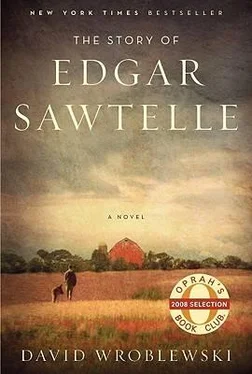Plus, to top it all off, Henry was such a strange character. His warning about not being trustworthy-people didn’t say things like that. At the same time, Henry clearly liked them. He’d even glimpsed the man smiling after the morning’s ruckus. Or maybe that had just been his reaction to the sight of Edgar toppling to the floor. But even if Henry had been sincere in his offer, on his drive to work (wherever that was) he could decide he’d made a mistake-what was he doing, turning his house over to a stranger? The next thing Edgar would know, a squad car would be pulling into the yard. After weeks in Chequamegon woods, Edgar felt sure that, able-bodied, they could evade any single pursuer. But with Tinder lame, and so many open fields around, there would be no ducking anyone. Not unless they had a long, long head start.
Of course, that was an option. They could leave, right that moment. Tinder’s wound would slow them down, but it wouldn’t stop them. He’d carried Tinder a mile the night before-true, his back was still aching like the blazes, but he could do it again if he had to. So what if they could go only a mile a day? A mile up the track from Henry’s house was as good as the next county, for all anyone knew, and once they got to a lake, they could lay up for a long time. Until now, they’d depended on no one. It was the one plan he knew worked.
He clapped Essay and Baboo back and led them all into the house. He started the water running in the shower and stripped. As the small mirror over the sink fogged, he looked at himself: hawk-thin, face dotted with mosquito bites, hair bleached brown and hanging over his blue eyes. The weeks they’d spent fending for themselves had burned away the softness in him, and he looked like a sight hound, edgy and strung up tight.
Also, he was filthy. The dirt on his sunburnt neck stopped somewhere around his shoulders. He fiddled with the temperature of the water, then stepped into the shower and pulled the white plastic curtain and lathered up. He let the steaming water course over his body. Despite his daily doses of Off!, every inch of his skin seemed to have been dinner for some horsefly, chigger, or mosquito. When the hot water was drained, he pushed back the curtain. Essay and Baboo stood peering quizzically through the doorway. He smiled and grabbed a towel and brandished it like a toreador.
After he’d dressed, he filled a bowl with Wheaties, milk, and honey and carried it with him as he looked around the house. The hallway was covered with pictures-an elderly couple posed before a studio backdrop, Henry’s parents, he guessed; some pajama’d children holding up toys beside a glittering Christmas tree; a younger Henry, in the lobby of a large building, next to his parents, a doubtful expression on his face. On the end table he noticed a portrait of a cherubic woman, signed in a loopy swirl, “Love, Belva.” The television remained dark when Edgar switched it on, but there was a record player in working order. On the bookshelves he found a stack of car repair manuals and some Bell System handbooks-it looked like Henry worked for the telephone company.
The bedroom door was closed. He considered opening it, but everything in the house was somehow of a piece, and he could easily imagine the plain bed, the linens rumpled but not too rumpled, the checkered bathrobe flung down. The dresser. The closet. More family pictures on the wall. Staying out of there was the only thing Henry had asked. He hadn’t even asked them not to rob him-which they had already done, gluttonously, and without a shred of remorse.
Edgar walked back to the kitchen and rummaged. He poured four cans of beef stew into one bowl for Essay and Baboo, and two cans of turkey and dumplings into another for Tinder, and set the bowls out. While they ate he peeled the Band-Aid off his thumb and inspected his wound. The cut was deep and ugly, but it was clean. He began rolling the sock off Tinder’s foot. His mind’s eye conjured the sight of Tinder thrashing on his back, spear of glass glinting both above and below. He hoped his imagination had made Tinder’s injury worse than it was-that it might look benign by the light of day.
It did not. A brown stain had formed on the dressings. Tinder licked and pulled at the bandage as Edgar unwound it. With difficulty, he rolled the dog onto his side and turned his foot upward. The pad had swollen to twice its normal size. He forced himself to part the wound and was rewarded with a spine-tingling view of pink and gray meat and a glimpse of a white cord contracting. Then he had to stop, partly because his head was swimming, and partly because Tinder yelped and yanked his foot away, licking it with long, slow swipes and looking reproachfully at Edgar.
The enamel wash pan sat on the counter. He filled it with warm water and metered out four drops of dish soap. Tinder threatened to revolt when Edgar set it on the floor. Edgar wrapped his hand around Tinder’s muzzle and looked him in the eye.
Get used to it, he signed. We’re going to do a lot of this.
FROM THEIR VANTAGE POINT in the field, Edgar watched Henry’s car stop beside the mailbox, then roll along the driveway. It was late afternoon, and he and the dogs had retreated to the spot where they’d slept away the previous afternoon, the best compromise he could think of between staying and going. Although Tinder couldn’t put the slightest weight on his foot, when Edgar had tried to carry him, he’d thrashed so mightily Edgar had set him down at once, afraid he might jump and compound his injury. Reluctantly, he’d let the dog pick his way along the fence line, taking half an hour to complete the journey. But once they were settled, Edgar felt much better. He’d taken a chance that morning and down-stayed the dogs in the house and run up the tracks to fetch the Zebco and the satchel from the railroad embankment. Now the fishing equipment was hidden amidst the sunflowers. In a few seconds they could all be hidden amidst the sunflowers, even Tinder.
Down below, Henry stepped out of his sedan, a bag of groceries under his arm and lunchbox in hand. He called out and opened the back door, then disappeared inside. They had left the house empty and unlocked, without even a note of thanks. It was rude, but he couldn’t leave evidence that he and the dogs had been there, in case Henry arrived accompanied by-well, who knew who might tag along, or follow a few minutes behind?
Henry returned to the stoop, beer in hand. He looked around the yard. Edgar ducked, and when he raised his head again, Henry stood on the road, staring along the blacktop and shaking his head. Then he dragged a round-bellied barbeque grill from the barn to the stoop. He produced a bag of briquettes and a can of lighter fluid and soon flames jumped out of the black hemisphere and heat waves shimmered above.
In short order Henry carried out two kitchen chairs and a card table which he unfolded on the lawn. He set plates on each side of the table and populated the center with a bag of thick brown rolls, bottles of ketchup and mustard, and a dish of something that was either potato or macaroni salad. He used a drinking glass as a weight over a small sheaf of paper and he dropped a pair of yellow pencils into it. Then he unwrapped a package of what could only be fresh bratwurst and arranged them on the grill and opened a can of baked beans and let it heat beside the brats. When everything was cooking to his satisfaction, and a column of smoke rose off the grill, Henry sat in one of the chairs and unfolded a newspaper.
Watching it all made Edgar smile. If they had been spotted, Henry could have just shouted to them without going through this performance. Probably, though, Henry had no idea whether they were nearby, much less watching. It was an interesting act of faith from a man who declared himself reckless and unpredictable. If anything, Henry struck Edgar as wildly dependable-making dinner and acting out this invitation for guests he couldn’t even be sure existed.
Читать дальше
Конец ознакомительного отрывка
Купить книгу












